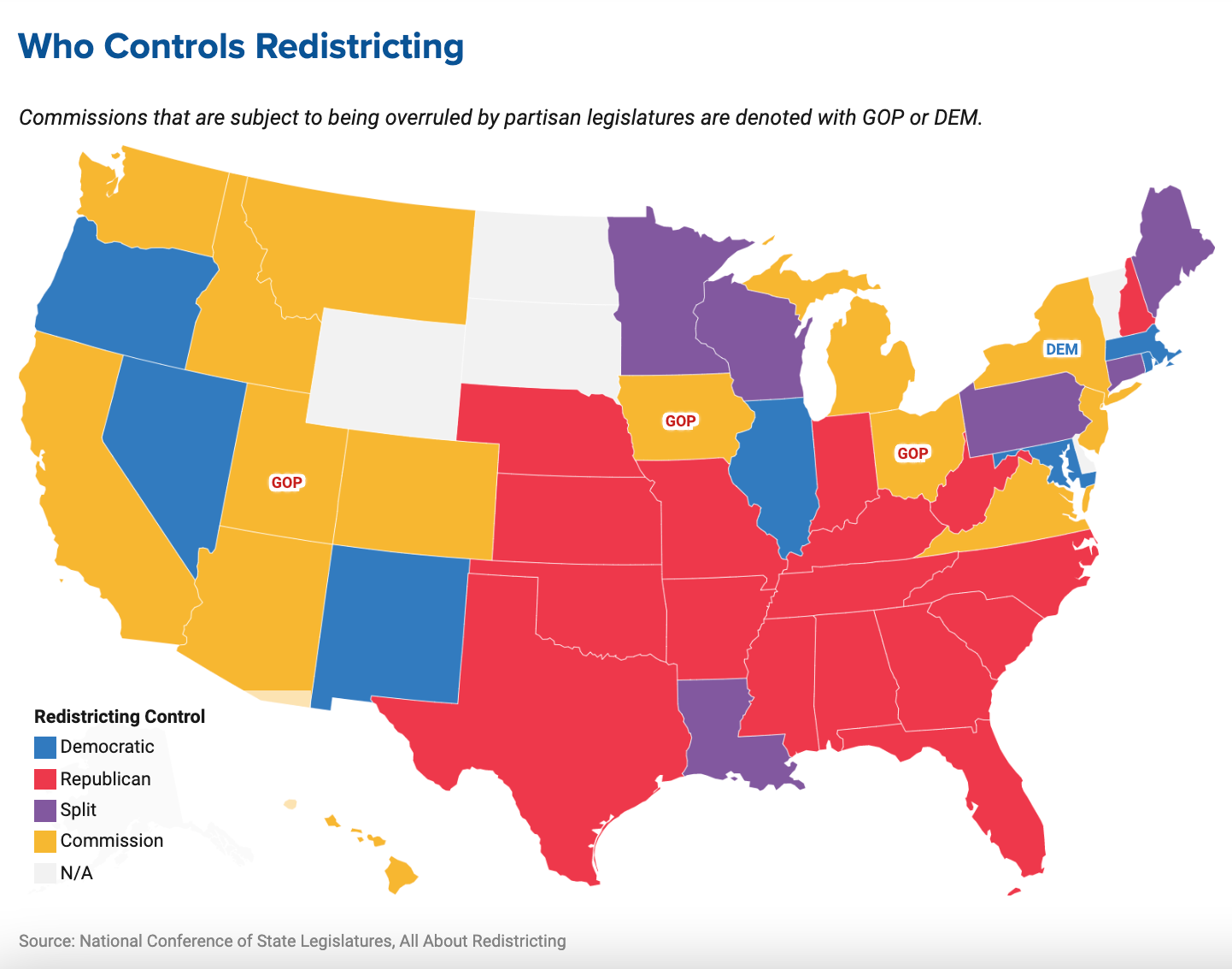Wake Up To Politics - May 3, 2021
Wake Up To Politics: Six early indicators for the 2022 midterms
Good morning! It’s Monday, May 3, 2021. Election Day 2022 is 554 days away. Election Day 2024 is 1,282 days away. Today is World Press Freedom Day.
If you haven’t had a chance to fill out the new reader survey to let me know how I’m doing, you can do so here.
Six early indicators for the 2022 midterms
As you can see above, the 2022 elections are almost exactly a year and a half away. Now, that may seem like a far time away: but rest assured, both parties have already started positioning in earnest to either defend their seats in the House or Senate or attack the other side’s.
And before you email me saying it’s too early to be talking about the midterms, allow me this explanation: I’ve made a conscious choice these past few months to scale back on horse-race political coverage and scale up on government coverage, from explainers on the reconciliation process, the filibuster, and apportionment to near-daily updates on the Biden agenda.
But the midterms are a government story too: the future of that sweeping Biden agenda largely hinges on whether Democrats will be able to maintain their razor-thin congressional majorities next fall. Whether Democrats have a few more years of complete control in Washington or just a few more years will be the deciding factor in whether they achieve most of what they want to get done. So, with that in mind: here’s a first stab at some early indicators to keep in mind as the 2022 midterms heat up. (And still feel free to email me if you feel otherwise!)
1. Historical trends (advantage: GOP). This is the most important truism to remember when thinking about how the congressional elections will go next year: Midterms almost never go well for the sitting president’s party. Since World War II, the party in the White House has only picked up seats in the House twice in midterm years: in 1998, due to a backlash to the impeachment efforts against President Bill Clinton, and in 2002, due to a surge in popularity for President George W. Bush after 9/11.
In fact, the average outcome for a president’s party in that time period has been to lose 26 seats in the House and 4 seats in the Senate. After a few upcoming special elections shake out, Republicans will likely need to pick up just five seats in the House and one seat in the Senate to reclaim the majorities; history is firmly on their side in their quests to do so.
2. Special elections (advantage: GOP, but don’t read too much into it). The reason control of Congress is on my mind this morning is a special election that took place in Texas’ 6th congressional district on Saturday, due to the late Rep. Ron Wright’s death from COVID-19. Two Republicans advanced to a runoff for the seat: Susan Wright, the late congressman’s widow, and state Rep. Jake Ellzey, his former primary rival.
It would have been an uphill climb for Democrats to win the seat, but the fact that they didn’t even have a candidate finish in the top two on Saturday — and won’t have an opportunity to contest the district, which President Biden lost by just 3% last year — is an embarrassing black eye for the party. This doesn’t mean you should read too much into a single special election: but in the past, special elections have served as fairly accurate barometers for how the next general election will go. (Recall the Democratic wins in 2017 special elections, followed by their blowout performance in 2018.)
As elections analyst Kyle Kondik put it on Twitter, “If you’re expecting Democrats to buck history and have a good midterm in the House next year, you’d be looking for positive signs for them in specials.” And their failure to have a candidate advance on Saturday “is not a positive sign,” he added. There are three other special elections slated to take place in the coming months, although they are mostly located in non-competitive districts.

3. Presidential approval and national mood (advantage: Dems). The state of a president’s approval ratings is also generally a strong indicator of how their party will do in the midterms. The two presidents who gained House seats in the midterms — Clinton and Bush — are also the only two to go into those elections with approval ratings over 47% and disapproval ratings under 44%.
Biden is in that sweet spot right now, averaging a 54% approval rating and 41% disapproval rating. An ABC News poll also came out this weekend showing that 64% of Americans are optimistic about the direction of the country, amid strong economic economic indicators, which is more good news for Biden. Democrats will likely need those numbers to remain stable in order to have a fighting chance at staving off losses next year
4. Redistricting (advantage: GOP). When it comes to control of the House, who gets to draw the House maps is no small question. And this year, it will mostly be Republicans: GOP state legislators has final authority in drawing 187 district lines, compared to 75 for the Democrats, according to Dave Wasserman of the Cook Political Report. (The rest are drawn on a bipartisan basis.)
The Republican redistricting advantage extends to Texas, Florida, and North Carolina — three of the states that gained seats in the apportionment process last week. Add in GOP-controlled Georgia as well, Wasserman writes, and Republicans “could conceivably pick up all five seats” they need to win the House majority based off of redistricting alone. (The Senate, of course, cannot be redistricted and Democrats face a rosier map on the Senate side in general.)
5. Retirements (advantage: GOP in the House, Dems in the Senate). There has historically been a strong correlation between congressional retirements and midterm results, with the party losing more retiring members generally faring poorer. This year, retirements are shaking out differently in the two chambers: “A growing list of House Democrats from competitive districts is headed for the exits,” the Washington Post reported this weekend. Rep. Cheri Bustos (D-IL) is the latest example; as the Post noted, her departure and others complicate the party’s attempts to cling to their slim majority in the chamber.
But on the Senate side, five Republicans and zero Democrats have announced plans to step down. Several of the departing GOP senators, such as Pat Toomey (R-PA), leave behind prime pick-up opportunities for the other side.
6. Party unity (advantage: Dems). This last indicator is one that’s hard to quantify, but important to keep an eye on nonetheless. While both parties are often described as “big tents” with plenty of warring factions, it goes without saying that it’s better to march into a midterm year more aligned than divided. On the Democratic side, a hotly contested presidential primary last year has largely subsided, as progressives and the party faithful have learned to love Joe Biden and united behind his agenda.
It’s a different story for Republicans, among whom Donald Trump remains a critical dividing line. This week, the intraparty spat to watch is at the very top of the House Republican Conference — at a time when they should be laser-focused on winning back the Speaker’s gavel. Rep. Liz Cheney (R-WY), the chair of the conference, is reportedly on the bubble again amid a dispute with House Minority Leader Kevin McCarthy (R-CA).
Cheney and McCarthy are bitterly split over whether Trump should remain a force in the GOP. With McCarthy’s help, Cheney survived a challenge to her leadership position after voting to impeach Trump earlier this year, but a second vote to remove her is reportedly in the works — and her survival is far from guaranteed. Not exactly the battles you want to be fighting when you have a majority to win back.

A message from Gabe
I’m committed to keeping Wake Up To Politics completely free and growing only be word of mouth. But to do that, I need your help — and now you can help share WUTP and win rewards at the same time!
Below, find your unique referral link: if three of your friends sign up using the link, you’ll get access to an exclusive Zoom Q&A session with me and other members of the WUTP news team! If 10 friends sign up, you’ll also get a free WUTP mug.
Thank you so much for your help sharing the newsletter. Copy your unique referral link to send to friends: *|RH_REFLINK|*
Or click to share your link directly to Twitter, Facebook, or email.
The Rundown
Some more headlines to know this morning
CORONAVIRUS
President Biden will restrict travel from India starting Tuesday amid a deadly surge of Covid infections in the subcontinent. The restrictions will not apply to American citizens. NBC NewsCONGRESS
Congressional Democrats are considering breaking Biden’s $2.3 trillion infrastructure plan into several pieces in an attempt to attract Republican votes for some of the provisions. Washington PostINVESTIGATIONS
Federal prosecutors are seeking former New York City Mayor Rudy Giuliani’s communications with an array of Ukrainian officials, as the probe into his overseas activities as former President Trump’s personal lawyer intensifies. Wall Street JournalRECOMMENDED READ
The 10-year anniversary of the raid that killed Osama bin Laden was this weekend. This fascinating oral history of the decision to greenlight the mission, and the experience of watching it in real time, is worth spending some time with. Politico Magazine
Daybook
What’s happening in Washington today. (All times Eastern.)
President Joe Biden will receive his daily intelligence briefing at 8 a.m. before traveling to Virginia with First Lady Jill Biden as part of the “Getting America Back on Track Tour,” to highlight his $4 trillion economic plan. The visit will specifically focus on the plan’s benefits for American schools.
At 10:30 a.m., the Bidens will visit Yorktown Elementary School in Yorktown, Virginia. At 1:05 p.m., they will visit an HVAC workshop at Tidewater Community College in Norfolk, Virginia. At 1:30 p.m., they will deliver remarks at the community college. The president and first lady will then return to the White House, touching down at 4 p.m.
Vice President Kamala Harris will ceremonially swear in former Sen. Bill Nelson (D-FL) as NASA Administrator at 9:50 a.m. Later, at 1:30 p.m., she will ceremonially swear in former UN Ambassador Samantha Power as Administrator of the U.S. Agency for International Development (USAID).
White House Press Secretary Jen Psaki does not have a press briefing scheduled.
The Senate will convene at 12:45 p.m. for a brief pro forma session.
The House is not in session.
The Supreme Court will release orders at 9:30 a.m.
Thanks for waking up to politics! If you enjoy reading this newsletter, I’d be so grateful if you’d consider donating to help support me and my work. If you want to show off your support for Wake Up To Politics, you can also buy some merchandise.
Also: don’t forget to tell your friends and family to sign up for the newsletter at wakeuptopolitics.com. And if you have any questions or comments, feel free to email me at any time.




